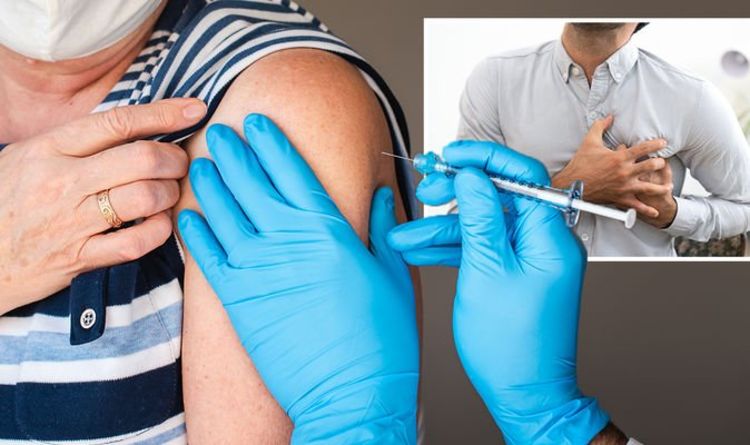
The Oxford-AstraZeneca and Pfizer-BioNTech vaccines appear to be exceeding even the most optimistic expectations. New data released by Public Health England (PHE) shows that a single shot of either vaccine reduces the chance of needing hospital treatment by more than 80 percent. For most people, getting a jab will cause only mild and short-lived side effects.
In very rare instances, it is possible to experience anaphylaxis after receiving the Pfizer/BioNTech.
Anaphylaxis is a severe and potentially life-threatening allergic reaction.
The symptoms include:
- Feeling lightheaded or faint
- Breathing difficulties – such as fast, shallow breathing
- Wheezing
- A fast heartbeat
- Clammy skin
- Confusion and anxiety
- Collapsing or losing consciousness.
As PHE reports, On 9 December 2020, the Medicines and Healthcare Products Regulatory Agency (MHRA) issued preliminary guidance on severe allergic reactions after the Pfizer/BioNTech vaccine due to early reports of anaphylaxis.
READ MORE: Brazil variant symptoms: High temperature, cough and loss of smell and taste are symptoms
As the PHE explains, widespread use of the vaccine now suggests that severe allergic reactions to the Pfizer/BioNTech vaccine are very rare.
“Anaphylaxis can also be a very rare side effect associated with most other vaccines,” says the health body.
It adds: “Following very substantial exposure across the UK population, no other new safety concerns have been identified from reports received so far.”
It is common to experience mild side effects from receiving the Pfizer jab.
Initial research conducted by the Symptom Study app found around four in ten people experienced some local after effects after receiving the Pfizer jab.
These included pain and swelling on the arm where they received the injection.
Around one in seven also recorded systemic after effects including headache and fatigue, which are in line with the after effects reported in the clinical trial.
The reported after effects were short-lived, lasting just a day or two, and we haven’t seen any evidence of longer term health effects.
When will I be called up to receive the jab?
The NHS is currently offering the COVID-19 vaccine to people most at risk from coronavirus.
It’s being given to:
- People aged 60 and over
- People who are at high risk from coronavirus (clinically extremely vulnerable)
- People who are at moderate risk from coronavirus (clinically vulnerable)
- People who live or work in care homes
- health and social care workers
- People who get Carer’s Allowance.
The order in which people will be offered the vaccine is based on advice from the Joint Committee on Vaccination and Immunisation (JCVI).
The NHS will let you know when it’s your turn to have the vaccine. It’s important not to contact the NHS for a vaccination before then.
Published at Tue, 02 Mar 2021 15:48:46 +0000
Covid vaccine side effects: Anaphylaxis is a rare but severe allergic reaction













